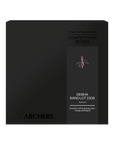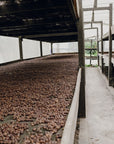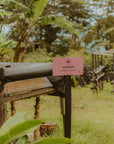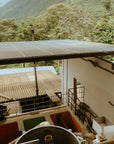La Palma y El Tucan is a world-famous coffee estate and eco-tourism destination situated in Cundinamarca, on the eastern side of the Colombian Andes, two hours away from the capital Bogota.
It was established in 2011-2012 by Felipe Sardi and Elisa María Madriñan, the well-loved change-making trailblazers among Colombia’s most innovative and awarded estates. As first-generation coffee producers, they resolutely pursued the life they had always dreamt about until it became the day-to-day they would wake up to.
By cultivating rare coffee varieties and pioneering experiments in post-harvest processing amid an apprehensive milieu and despite the steep costs and high risks, they have contributed to reorienting the status quo in Colombian coffee production toward a more holistic understanding and pursuit of quality to mean more than high cup scores and unique cup profiles.
In 2018, self-reflexively and proactively challenged the estate’s lucrative agricultural model. Taking advice from more seasoned agroecological coffee growers and with their hearts set on nurturing the health of their land for generations to come, they deliberately removed thousands of productive coffee trees, like Geisha, Sidra, SL-28, and Typica.
It was an unconventional move that invited skepticism but which founders, Felipe Sardi and Elisa María Madriñan deemed necessary and stood by to sustainably produce exceptional coffees while remaining respectful of nature and allowing it to regenerate.
Re-establishing the plantation following an agroecological model, which prioritized polyculture in place of monoculture and spurred biodiversity, aligned with their intention of growing their enterprise while being kinder to the natural environment.
As a result, they have redirected the attention and efforts of the more forward-thinking and eco-socially conscious members of our coffee community toward taking the preservation and regeneration of the natural environment into consideration as well.
And beyond that, they have also expanded the scope of their flourishing and influential enterprise to encompass less-equipped coffee farmers through their Neighbors and Crops business model, which has inspired like-minded producers to replicate and socialize it elsewhere.
Their coffees have reaped awards on national and world coffee competition stages since 2016. 2019 was most memorable when Korea's Jooyeon Jeon used their coffee to win 1st Place in the World Barista Championship.
The Exporter:
Equation Coffee represents a small group of like-minded Panama and Colombia producers that enact eco-socially conscious choices in their coffee cultivation, processing, and marketing. They are La Palma & El Tucan, Delagua Coffee Paradise, and Creativa Coffee District. Their business model, called Neighbors & Crops, is geared towards invariably innovating and delivering premium specialty coffee while making a lasting, beneficial impact on the community and the environment.
Our long-term relationship with Equation Coffee has allowed us to make internationally sought-after coffees available here in our corner of the world.










